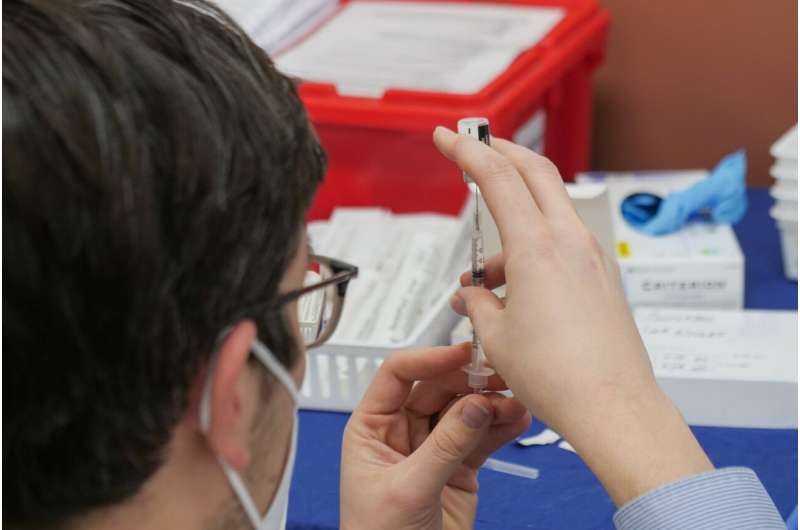No evidence yet that adenovirus vaccine technology causing blood clots

This week, US health authorities recommended pausing the rollout of the one-shot Johnson & Johnson/Janssen COVID-19 vaccine while investigations into exceptionally rare blood clots take place.
Six women suffered blood clots out of nearly seven million doses administered.
The J&J vaccine uses broadly similar vaccine technology as the AstraZeneca vaccine, known as adenoviral vectors, which has led some experts to speculate there might be a link between this vaccine platform and the very rare blood clotting condition known as "vaccine-induced immune thrombotic thrombocytopenia" (VITT).
So far, a link between adenovirus technology in general and blood clots is purely speculation—there's no evidence yet—but it's worthwhile for health authorities to assess the data and for researchers to try to understand:
- can adenoviral vectors in general cause VITT?
- is VITT specific to the AstraZeneca adenoviral vaccine?
- are certain unlucky individuals pre-disposed to develop VITT?
So what's an adenovirus, and how are they used in vaccines?
Adenoviruses are a large family of viruses found in humans and other animals. In humans, some of these viruses can cause the common cold.
Scientists can also use these viruses to make vaccines, by using them to make what's called a "viral vector." A vector is a virus shell that researchers can use to package up and deliver a target from another virus.
To make an adenoviral vector, scientists take an adenovirus and remove any genetic material that could either allow the virus to replicate and spread, or cause disease. Researchers then take the adenovirus shell and insert genetic instructions for how to make a target on the surface of another virus. For COVID-19, they use the instructions to make the "spike protein" on the surface of the SARS-CoV-2 virus.
To your immune system, an adenoviral vector looks like a serious virus, even though it can't replicate or cause disease. As a result, your immune system mounts a serious response, which is why people have been reporting more noticeable side-effects like a fever, fatigue and sore arm in the couple of days after the vaccine.
Similar but different
Currently, four COVID-19 vaccines use adenoviral vectors: AstraZeneca, Janssen/Johnson&Johnson, CanSino Biologicals and Sputnik V.
There are many adenoviruses out there to use as a starting point to make different adenoviral vectors. While these vectors can share some characteristics, they can also be biologically pretty different.
Different adenoviruses use different access points, known as receptors, to get into our cells. This can result in a very different size and type of immune response. Also, the adenovirus used in the Sputnik V and CanSino vaccines, called "rAd5," isn't very good at setting off the alarms in our immune system, while other adenoviral vectors are better.
Pause in Johnson and Johnson vaccine in the US.
Blood clots issue again- but so far running at less than one in a million doses.
Interestingly uses similar adenovirus vector technology as AZ vaccine -too early to say if linked.
Both are still safe and effective!#VaccinesWork https://t.co/eGu5qft4Od
— Neil Stone (@DrNeilStone) April 13, 2021
The different vaccines also deliver slightly different sets of instructions for the spike protein. The J&J vaccine, called "rAd26," instructs our cells to make a spike protein that's locked into a specific shape, to help our immune system recognize it, and it's delivered to the surface of the cell. The AstraZeneca vaccine, called "chAdOx01" instructs the cell to make a spike protein that isn't locked in place and it can be secreted from the cell.
Given these differences, if one adenoviral vaccine is linked with a particular effect in our bodies, for example blood clots, it doesn't mean all vaccines in this family will have that same effect. But regulators should still investigate.
We need to understand more about these blood clots
A number of regulatory bodies have issued notifications of a plausible link between the AstraZeneca vaccine and VITT.
This risk is very, very low—around one in 200,000 people that receive the vaccine could develop the condition. But for the rare person that develops VITT, the consequences can be serious, with around one-quarter of those with the condition dying from it. So regulators are taking the situation seriously.
VITT isn't like other clotting conditions. There are many different types of clotting conditions but it seems VITT is likely to be caused by an unusual immune response.
We don't know exactly what triggers this immune response. There have been reports of clotting conditions with adenovirus infections or very high doses of adenoviral vectors. However, this occurred very quickly, while VITT is a delayed response, observed 4-20 days after vaccination. It seems more likely at this stage that, in certain very rare patients, some kind of unusual immune response may be triggered.
While researchers try to understand VITT, many regulators are taking a cautious approach—advising their communities, giving guidelines for preferred vaccines with younger age groups and revisiting data for other vaccines to be vigilant.
In doing this, regulators must balance a very rare risk of VITT with the AstraZeneca vaccine, with a very real risk of death and disease that face people with COVID-19. For many people, particularly older people in regions with community transmission of the virus, it still makes clear sense for their health to receive whichever COVID-19 vaccine is available.
These are complex decisions resulting in nuanced information that is hard to communicate. But the fact regulators are engaging with them quickly and transparently has been reassuring to me and, I hope, others in our broader community.
This article is republished from The Conversation under a Creative Commons license. Read the original article.![]()




















